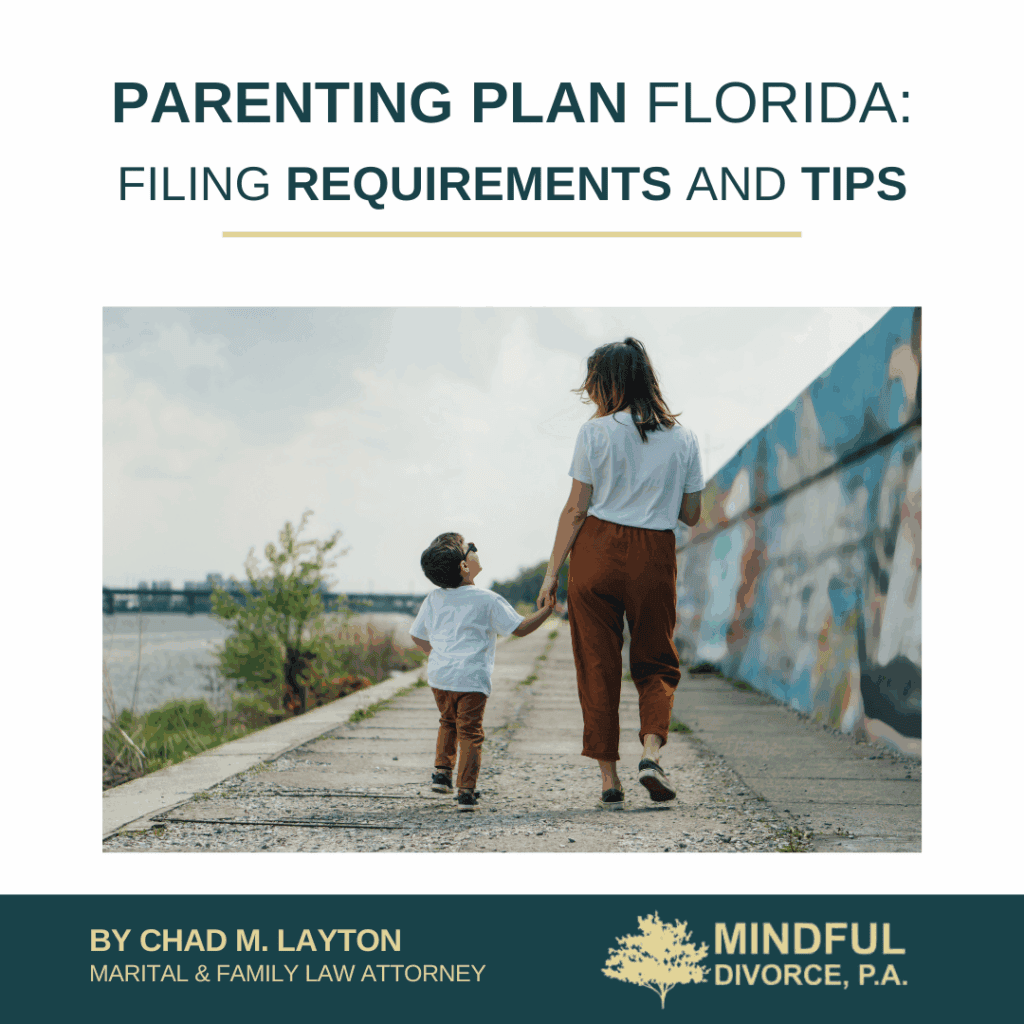
Co-parenting during divorce is tough, and it can feel even heavier when your kids are caught in the middle. A clear parenting plan lowers conflict and gives your children a steady routine, which is what really counts.
At Mindful Divorce, P.A., we focus on peace of mind, using transparent, fixed-fee services that help you keep costs under control. This guide walks you through Florida parenting plans, filing steps, and practical tips you can use right now.
Parenting Plan Overview in Florida
A parenting plan is required in every Florida divorce or paternity case that involves minor children. The plan explains how you and the other parent will share parental responsibility and time with the kids. Courts approve a plan only if it serves your child’s best interests under section 61.13(3), Florida Statutes.
Your plan should cover the daily nuts and bolts, plus the big picture items that affect school and health. Keeping it detailed often prevents later arguments and extra trips to court.
Core parts of a Florida parenting plan include:
- How parents will share daily tasks like homework, meals, and bedtime routines.
- The time-sharing schedule, showing weekdays, weekends, holidays, and summer.
- Who handles healthcare, school matters, and the address used for school boundary purposes.
- How parents and children will communicate, such as phone, video, or a parenting app.
Once you know what a plan covers, the next step is getting your paperwork started the right way.
Florida Parenting Plan: Key Filing Requirements
To open a parental responsibility case, you will complete standard family court forms from the Florida Courts database. Forms must be typed or printed in black ink, and many require signing in front of a notary or a court clerk.
Every case needs several baseline documents. The list below covers the usual set used statewide.
- Cover Sheet for Family Court Cases.
- UCCJEA Affidavit.
- Child Support Guidelines Worksheet, used to calculate support.
- Parenting Plan, Florida Supreme Court-Approved Family Law Form 12.995(a), customization allowed.
You can file in person with the circuit court clerk or submit through the statewide e-filing portal. The parent who opens the case is the petitioner, the other parent is the respondent, and filing fees for petitions often fall between $300 and $500.
After you file, the respondent must be formally served by the sheriff or a private process server. The respondent then has 20 days to respond or ask for extra time, which keeps the case on track.
Table: Parenting Plan Filing Steps and Fees
| Step | Task | How | Fees or Deadline |
| 1 | Complete forms | Download from Florida Courts site, fill in black ink, notarize when required | None for forms, notary fees vary |
| 2 | File the case | In person with clerk or through e-filing portal | About $300 to $500 for petitions |
| 3 | Service of process | Sheriff or private server delivers papers to respondent | Service fees vary by county |
| 4 | Response | Respondent files answer or counterpetition | Due within 20 days of service |
With filing logistics squared away, let’s turn to what your plan should actually say to work well day to day.
Essential Elements of a Parenting Plan
Daily responsibilities should be clear and realistic. Think about your child’s age, school needs, medical needs, and any particular routines, then assign duties in a way that both homes can follow.
Time-sharing works best when it is specific. Spell out pickup and drop-off times, which parent has which days, how you will rotate holidays, and how summer looks when school is out.
Communication rules help kids feel connected and prevent friction. List acceptable methods, set reasonable time windows for calls or video chats, and state whether the child or parent starts the call.
Transportation and exchanges often cause tension, so cover the details. State pickup locations, who drives, what happens if someone is running late, and how you will handle last-minute changes that come up for normal life.
For school, your plan should name which parent’s address will be used for school boundary and registration. This one line can avoid a lot of stress when enrollment time shows up.
If you want simple guardrails for schedule design, try this quick checklist:
- Keep school nights consistent, with a predictable bedtime and homework window.
- Rotate major holidays, and write exact start and end times.
- Give both parents quality time, not just driving time, on their days.
Once you have the content, a few practical habits will help the plan run smoothly in real life.
Parenting Plan Tips: Ensuring a Smooth Process
Staying calm helps you make better choices for your child. Try to focus on what helps your child feel safe, even when the adults do not agree on every point.
If your child is old enough, listen to what they think without pressure or promises. Kids do better when they feel heard and not stuck in the middle.
- Keep money talks separate from parenting time and school decisions.
- If talks stall, try mediation to work through schedules and rules with a neutral helper.
- Plan for the future, like college costs, driving age, and what happens if someone relocates.
- Read section 61.13(3), Florida Statutes, which lists the factors judges look at for the best interests of your child.
Sometimes, life changes after the plan is in place, and you need a formal update.
Modifying a Parenting Plan in Florida
Changing a parenting plan requires a showing of a substantial change in circumstances and that the requested change serves your child’s best interests. Florida updated the law in 2023 to remove the old “unanticipated” requirement for modifications, which makes the legal test more direct.
Courts look for real shifts that affect the child, not small bumps that both homes can handle with normal flexibility. Gather clear facts and documents before you file.
Examples of substantial changes that can support a modification include:
- Substance abuse that places the child at risk.
- Domestic violence, child abuse, or neglect.
- Serious mental health issues that affect parenting safety or stability.
- Work or location changes that make the current schedule unworkable.
The form to start this process is the Supplemental Petition to Modify Parental Responsibility, Visitation or Parenting Plan/Time-Sharing Schedule, Florida Family Law Form 12.905(a). Filing also triggers service and a response timeline, similar to the original case.
If you are unsure whether your facts reach the legal standard, a short consult can save you time and costs later.
Build a Parenting Plan that Works for Your Family
If you are building a parenting plan in Florida, or you need a change to an existing plan, we can help you move forward with clarity. Our team focuses on calm, workable solutions that protect your time with your kids and reduce conflict at home. Call us at 561-537-8227 or reach us through our Contact Us page to set up a consultation. With our fixed-fee schedules, you can focus on your family without stressing over unpredictable bills.



